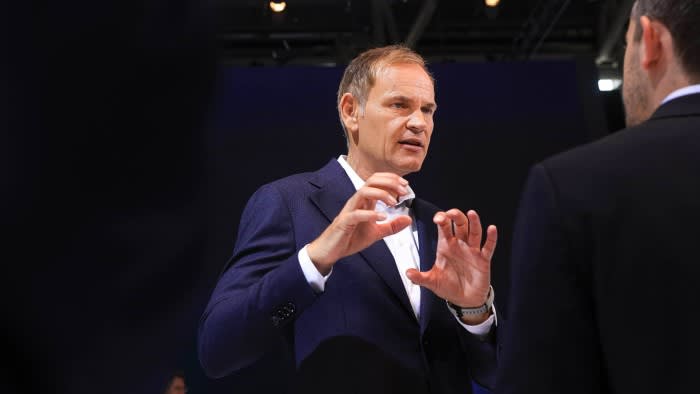Twenty years ago, Oliver Blume received his PhD in Shanghai under the supervision of Wan Gang, who later, as China’s minister of science and technology, became the driving force behind the country’s electric vehicle revolution.
Blume, chairman of both Volkswagen and Porsche, must now protect two of Germany’s biggest industrial names from the achievements of his former professor, who founded Chinese leaders in the electric car industry, from car manufacturer BYD to battery giant CATL.
The biggest challenge for Blume is how nearly century-old companies that pride themselves on the quality of their hardware should reinvent themselves for the coming era when vehicles are electric and dependent on software.
The 56-year-old made one of his boldest moves yet this week when Volkswagen announced an investment of up to $5 billion in California-based EV startup Rivian. The two groups will form a joint venture to develop new software, with Volkswagen getting direct access to Rivian’s EV architecture.
“When it comes to a major technological transformation, you can’t do it all alone,” he told the Financial Times. “It has to be a win-win situation. . . The motivation on our part is to accelerate the software transformation at Volkswagen across all our brands. Rivian has the best architecture in its class. . . Volkswagen has the scale.”
Volkswagen, which owns the majority of Porsche, is struggling to make the switch to electric cars. At the same time, the brand is struggling to make serious inroads into the US and is rapidly losing its dominant position in China.
The deal with Rivian was seen as a lifeline by investors in the American company, sending its share price up more than 30 percent. However, some Volkswagen shareholders are concerned about the size of the investment: almost half of the group’s estimated net cash flow for the year.
However, observers said the move showed an acceptance that Volkswagen’s attempts to develop software had failed, and that the company would have to look elsewhere to catch up with digital automakers such as Tesla and BYD.
Blume was born in Braunschweig, a short distance from VW’s headquarters in Wolfsburg, and studied mechanical engineering at the city’s technical university before joining Audi as an intern in 1994. Over the next few years he worked his way up within the VW Group, including a stint as head of production for the Seat brand in Spain, where he still has a home.
He is held in high esteem by many of his colleagues. Daniela Cavallo, chairman of the Volkswagen Group works council — the body that represents the interests of the company’s 680,000 employees worldwide, made up of elected employees and management — calls him a “true team player” and praises his “clear strategy” and reliability.
When Porsche’s CEO took control of the parent company in 2022, becoming the only person to simultaneously lead two Dax 40 companies, Blume inherited Volkswagen’s faltering attempt to develop EV software in Germany with subsidiary Cariad.
“From an investor’s perspective, the entire Cariad solution was actually associated with delays, failures, high costs and an environment that caused quite a stir within the Volkswagen world,” said a senior executive at a major European asset manager. “Unlike his predecessor, Oliver Blume did not see the benefits of ‘Software made in Wolfsburg’.”
Blume also led a historic collaboration with Chinese EV manufacturer Xpeng in January to jointly develop a new generation of EVs, effectively moving Chinese software development out of Germany.
“We’ve made a lot of important decisions in the last year and a half,” Blume said. “It’s up to us to combine our heritage with this future technology.”
With the collaboration with Rivian, the company wants to tackle software development issues on the one hand and, on the other, gain a greater position in the American premium market, where competitors such as Mercedes, BMW and Tesla are doing better.
“Blume may want to be the first CEO to focus more attention on North America than his predecessors,” said Matthias Schmidt, an independent auto analyst. “If he can succeed here, it could be as big a move as when former Volkswagen CEO Carl Hahn [from 1982 to 1993] decided to redouble the attack on China.”
The strategy is all the more essential as Volkswagen is rapidly losing market share in China, from almost 20 percent in 2020 to 15 percent last year.
“This is what we need most of all [move] in North America to find a better balance between the regions,” Blume said, referring to the three most important sales markets of China, Europe and North America.
His predecessor Herbert Diess thought the solution was to revive Scout, an American cult brand from the 1960s and 1970s, from which VW acquired the brand in 2021, and penetrate the US. Blume hopes that outdoor brand Rivian, whose SUVs and pickup trucks start at about $80,000, could be a better entry point.
Blume is an avid player and spectator of tennis. A colleague and tennis partner said the FT Blume was a methodical player, exchanging three or four shots before evolving into a winner.
Industry insiders say he is different from previous Volkswagen bosses, who through sheer personality managed to exert their will on the different factions in Wolfsburg.
“VW is a strongman company — full of towering egos and strong brands,” said an auto industry veteran who knows Blume. “Oliver is gentle and really listens to people. The question at VW is, can a nice man prevail? Especially if he has to make more difficult decisions than his predecessors?”
Additional reporting by Mari Novik and Kana Inagaki
